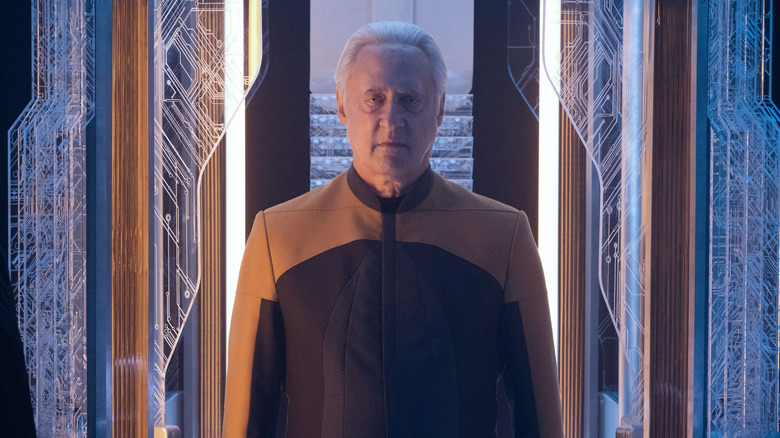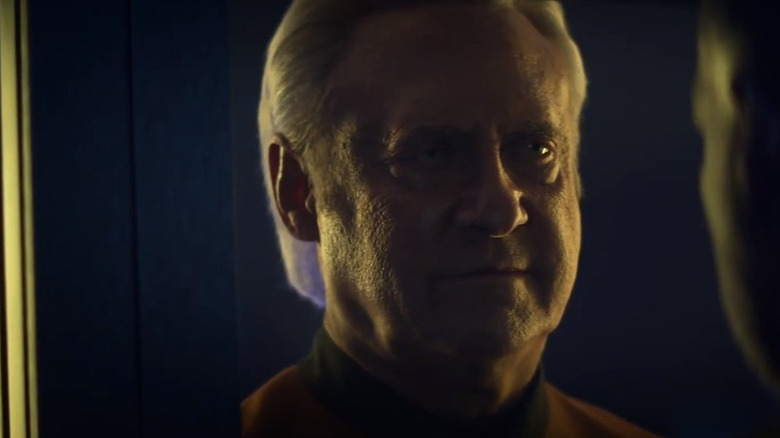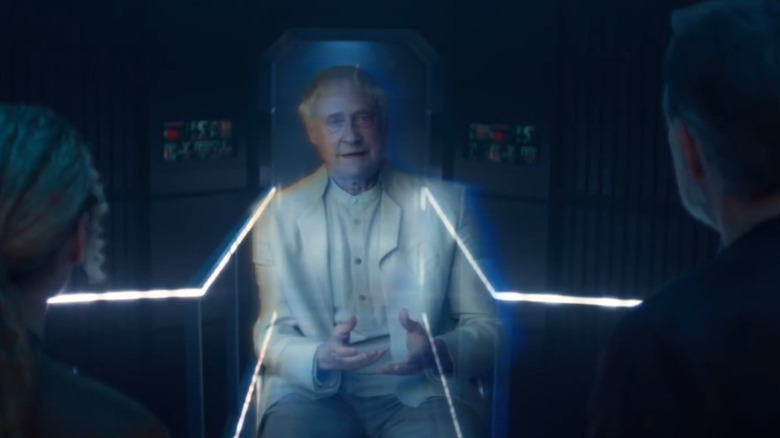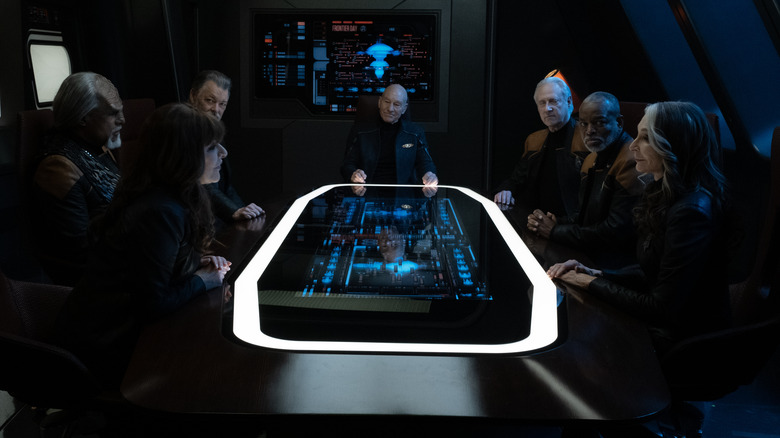In Star Trek: Picard Season 3, Growing Older Is Awesome And Data Is Leading The Way
This article contains spoilers for season 3, episode 9 of "Star Trek: Picard."
In the "Star Trek: The Next Generation" episode "Inheritance" (November 22, 1993), the writers tossed in a quick, throw-away line of dialogue that explained away an ever-widening continuity problem of the show. In "Inheritance," the android Data (Brent Spiner) is introduced to a character name Julianna O'Donnell (Fionnula Flanagan), a long-lost wife of his creator, Dr. Noonien Soong. Effectively, Julianna is Data's mother. Later in the episode, when Julianna is injured, it's revealed that she, too, is an android, modeled after Soong's actual wife, who perished years before.
While examining the android Julianna, Geordi La Forge (LeVar Burton) explains how she operates and how her positronic brain was constructed. Dr. Crusher (Gates McFadden) notes that she gives off a false signal designed to throw off medical scans and trick doctors into thinking she's human. Geordi then also mentions that the signal is part of her program. "Not only does she age in appearance like Data, her vital signs change too." Nothing more is said of the issue.
Wait. Go back. "Age in appearance like Data?" Brilliant. This would explain how an android character like Data, made 100% of artificial parts, would age. An "aging program." After all, Data is played by the very human Spiner, and he came to look different over the seven years that elapsed between the beginning and end of the series. The mere mention of an "aging program" covers all the bases.
As of this writing, Spiner is 74, but has returned as a version of Data in the third season of "Star Trek: Picard." Thanks to another throw-away line of dialogue, however, Data's appearance as a 74-year-old man is not only explained but presented as a new superpower. Aging, it seems, is an exhilarating experience.
What a gas it is getting old
Data, of course, had returned in the first season of "Star Trek: Picard." A major plot thread involved a Federation scientist salvaging a single particle of Data's exploded body and somehow reconstituting his entire brain, complete with his memories, from it. Shortly after that, Data's memories were discovered on a computer hard drive, located on a distant androids-only planet. Picard (Patrick Stewart) also shunted his own consciousness into the hard drive, and he and Data were able to have face-to-face conversations inside. During those conversations, however, Brent Spiner's Data was digitally de-aged to look like he did back in 2002. He also plead for his own death, willing to finally experience mortality.
The man storing Data's consciousness, however, clearly didn't let it be deleted, and wasn't concerned with Data's pleas to die. Indeed, Altan Soong (also Spiner) eventually created a new android, with Data's consciousness completely restored. In the sixth episode of the third season of "Picard," it is explained that this new android not only contains Data's brain, but Lore's, Lal's, Dr. Noonien Soong's, and B-4's as well. This was to be a new composite being that possessed the emotions and experiences of multiple androids. The telling, throw-away line of dialogue? "This time, with the wisdom and true human aesthetic of age." With the totality of age, he says, a person may rise to be the best of us. If this new Data is going to be wise, then he'll need to look like an older man. Hence the grey hair and the wrinkles.
"Picard" is arguing, in that moment, that being old is preferable to being young. This is a fitting message for a returning cast whose youngest member is 68.
It's also refreshingly anti-ageist.
Old age is necessary
A few episodes later, when Data has been revived, he reveals that he does indeed possess memories and sensations that he had never experienced before. He cocks his head and his neck pops slightly. It clearly hurts, and the moment will be familiar to anyone who has experienced age-related neck problems. Rather than bemoan the experience, however, Data smiles, claiming that being old is going to be an interesting, exhilarating new adventure.
Indeed, being old was a plot point in the ninth episode of "Picard." Thanks to a complex series of events, Borg gene probes had infiltrated the brains of anyone who'd been using a transporter. It was explained, however, that the probes can only take hold in brains that are still developing. Since the human brain doesn't stop developing until around age 25, all of Starfleet's younger officers become infected. At the end of the episode, Starfleet was under attack from, essentially, every ensign in the fleet. In all honestly, it sounds more like a story from "Star Trek" Lower Decks."
However, since the "Next Generation" cast are all older than 25, they are left safe from the Borg infiltration, and are uniquely equipped to handle the Borg threat by mere dint of their age. It's not only exhilarating getting older. It's an advantage.
Additionally, the Borg baddies take advantage of Starfleet's high-tech ships to create a linked armada, joined by a shared consciousness. How does one approach such an armada without being assimilated as well? Why, just find an older ship. Something analog. Something that is, essentially, not connected to the internet. Something that the oldsters are familiar with.
Why not have the NextGen crew fly off in a restored Enterprise-D to save the day?
Grandpa saves the day
An older crew, an older ship, and familiar, decades-old technology will rescue us. Look out, whippersnappers. Your space grandparents are here to save the day.
While the nostalgia of these moments is painfully corny — the reveal of the Enterprise-D will likely elicit as many groans as squeals — the message of aging characters still being capable is actually appreciated. This isn't a matter of "old guys still got it," like in, say, the movie "Old Dogs" or "80 for Brady." This is an outward declaration that being old is better than being young. Despite the amount of nostalgia in the pop marketplace, genre heroes still tend to hover around age 25. Younger characters still have their lives to figure out, but are lithe and physically capable enough to be fighters and action heroes. As such, screenwriters tend to focus on that age group. "Picard" is saying that youths are the ones most susceptible to corruption, and it's only those with wisdom and experience that can save the day.
This philosophy is in keeping with the general attitude "Star Trek" seems to have about artifacts from the past. One can regularly see Starfleet crew members reading paper books and using antique musical instruments. Even in the 24th century, there will be room for the kind of technology you prefer, including the dated stuff. One can recreate entire environments on the holodeck, but there will still be time to read an actual James Joyce book.
Picard and co. are the books to read through. Oldsters as heroes. You love to see it.
The "Star Trek: Picard" series finale premieres Thursday, April 20, 2023, on Paramount+.



